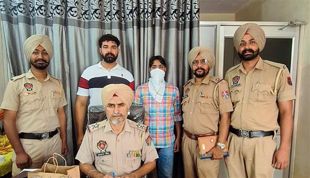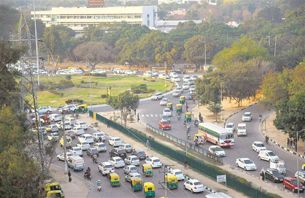
Umar Khan, 24, with his parents, shows photos of his younger brother Azhar who died last year in Bhopal. Thirty-five years after the Bhopal gas tragedy, survivors continue to demand rehabilitation and adequate compensation and proper medical treatment for ailments caused by the toxic leak photo: PTI
Shiv Visvanathan
Years ago, during the Suez crisis, British Prime Minister Harold Macmillan, reflecting on events, wryly observed that “a week is a long time in politics.” Viewed in this sense, a year is a long time in history. The alchemical power of the year as duration can literally alter the perspectives and paradigms of thought. The year 1984 in that sense was a special year in Indian history.
Ironically, in literature, 1984 is ranked as the title of George Orwell’s dystopian novel. It is a classic study, and yet even the imagination of Orwell as an anarchist militant in Spain and as a policeman did not go far. His vision of totalitarianism, stark in its conception, seemed lukewarm by the time the year arrived. If an Indian had to invent a version of 1984, he would pick a cluster of two events — the violence of the anti-Sikh riots and the narratives of the world’s worst industrial disaster in Bhopal.
Both revealed that violence was an inventive force in Indian society. It showed that when it came to disasters, whether riots or industrial tragedies, the state was complicit in them. It lacked the imagination to see that violence and the control of violence is a test of the competence of the state. The state, which in nationalist and leftist ideology, appeared a sacrosanct and all-powerful entity, responsible for the welfare of the people, suddenly appeared an ambiguous, ambivalent entity. The year 1984 marks the era when the Indian state began appearing as a genocidal phenomenon. The year in that sense was a crescendo of violence starting from Operation Bluestar, to Indira Gandhi’s assassination, to the riots and the December tragedy. Violence, in fact, acquires an innovative power. It becomes a language, a litany and the liturgy of its own, capturing a dystopic world that Orwell could not have imagined. A silence of indifference, not guilt, haunts the period. The year 1984 revealed the Indian state as a hard state in relation to its own people. It also revealed the growing emptiness of the Congress as a moral force.
Before India could even domesticate “the riots” as an imagination, the Bhopal gas tragedy occurred. Once again the litany of facts collected is dismal and captures the grey zones of the state. Let me list them out.
Journalist Raj Kumar Keswani had warned about the possibilities of a gas leak. His reports were ignored by the government and the scientific establishment. When the tragedy took place, the indifference to bodies was obvious. The moment of tragedy is compounded by acts of erasure and complicity.
The state hid the number of causalities. In many graves, at least four bodies were buried but were registered as one in the census of the dead. The Congress was complicit in the disaster. As one discovered, the Congress used to hold its meetings at the Union Carbide Guest House. Civil society rose to the occasion only to be brutally suppressed by the state. Activists like Anil Sadgopal and Alok Pratap Singh headed the early efforts to get justice for the victims and we needs to salute the courage.
The failure of the professions, especially science, medicine and law, was awesome. One realised that Indian scientists were illiterate about the gas. Nature’s editorial, in fact, captured the irony of the situation. It noted that one of the consequences of the disaster was that science understood the chemistry of methyl isocynate.
Indian law displayed itself as illiterate and weak with some lawyers claiming that Bhopal should be fought in American courts. The Bhopal disaster produced its own epidemic of ambivalence chasers till the government decided it was the sole representative of the victims. The government was supine in its attitude accepting a compensation of $410 million when Union Carbide was ensured against for $600 million. The victim acquired a stigma as survivor. In fact, the state treated the survivor as a receiver of a lottery rather than as a victim. Even today, Bhopal as a problem survives, despite or because of the indifference of the state.
Both the riots and the gas tragedy stand as liminal events, incomplete in their lack of closure. It took over a decade for social scientists to realise that the state was genocidal. One also sensed that civil society played the conscience keeper till it was ruthlessly suppressed for dissent. Violence was innovative and the state not an agency for welfare, but violence.
The year 1984 showed the state had changed to a hegemonic force and that civil society had to come up with ethical answers to new problems of violence. Little has been done, which is why 1984 and 2002 will haunt India in the decades to come. Sometimes, silence bursts through the indifference of time and society. One hears the echoes of 1984 in the events of today.



























